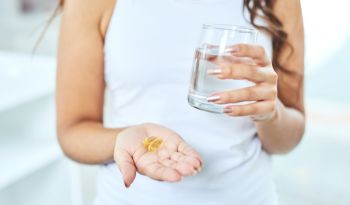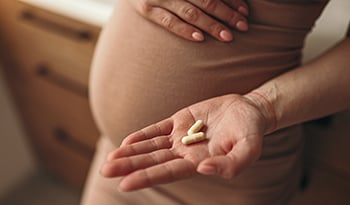Postpartum Nutrition 101: Healing Your Body and Supporting Breastfeeding

After giving birth, your body is in a state of recovery. You've just created and supported a new life—now it's time to focus on your own well-being. Proper postpartum nutrition is crucial for both your physical healing and nourishing your baby if you're breastfeeding.
The Importance of Nutrition Postpartum
While you may be tempted to restrict calories to shed baby weight quickly, it's important to prioritize nutrient-rich foods that will support your body's healing process after giving birth. Aim for a well-balanced diet incorporating plenty of fruits, vegetables, whole grains, and protein sources. These foods provide the essential vitamins, minerals, and fiber your body needs to recover and rebuild strength.
If eating regular meals is challenging or you find your protein intake dipping, add protein shakes with a meal or as a snack to increase protein content. If you are breastfeeding, shoot for about 1.5 to 1.9 grams of protein per kilogram of body weight.
Essential Nutrients for Postpartum Health
Here are some specific nutrients to focus on during the postpartum period:
Iodine
Iodine is a mineral that is essential for thyroid function and plays a vital role in metabolism and energy regulation. Foods high in iodine include seaweed, fish, dairy, and eggs.
Choline
Choline is important for brain development and cognitive function. It's also crucial for healthy breast milk production. Interestingly, prenatal and postnatal supplements typically contain little, if any, choline—so load up on choline-rich foods or consider an individual choline supplement.
Dairy, eggs, and organ meats are animal-based sources of choline, while plant-based sources include cruciferous veggies, nuts, seeds, and legumes.
Omega-3 Fatty Acids
These healthy fats are essential for brain health and development for both you and your baby. Omega-3s also have anti-inflammatory properties that can aid in postpartum healing. Studies have shown that adequate levels of omega-3s may also help prevent postpartum depression.
Fatty fish like salmon and sardines are some of the richest sources of omega-3s. If you don’t eat much seafood, you can add these healthy fats to your routine through flaxseed oil, chia seeds, or omega-3 supplements.
Vitamin D
Vitamin D plays a vital role in bone health, mood regulation, and immune function in adults as well as in infants. Spending time in the sun can be helpful, but if you live in higher latitude places that don’t get year-round sunshine, you may benefit from a vitamin D supplement.
Iron
Iron helps replenish blood loss postpartum, energy production, and immune function. Foods rich in iron include meat, fish, poultry, legumes, some nuts and seeds, and dark leafy greens. Iron supplementation may be necessary if there was excessive blood loss during birth or if you have a history of anemia.
Vitamin B12
Vitamin B12 is especially important for immune function, red blood cell formation, nervous system regulation, and mood support. Women with preexisting GI conditions, such as Crohn’s or colitis, or who follow vegan or vegetarian diets may have lower levels of B12 due to absorption issues and may benefit from a B12 supplement.
Adequate Hydration for Postpartum
Drinking plenty of fluids is essential for overall health and recovery. During postpartum, it's especially important to stay hydrated to replace fluids lost through breastfeeding and sweating.
Aim to drink at least 80 ounces daily—more if you're breastfeeding or sweating excessively. Adding electrolytes to your water is an excellent way to replenish minerals and stay hydrated. If you find yourself using the bathroom often, you may need to replenish your electrolytes more frequently.
Sample Meal Plan for Postpartum Nutrition
As a mom of a newborn, you have enough on your plate before even considering meal planning to meet your nutrient needs! Here's a sample meal plan to make things easier and provide some ideas for postpartum meals and snacks:
- Breakfast: Oatmeal with collagen and berries and nuts, or sourdough toast with eggs, cottage cheese, and a bowl of fruit
- Lunch: Salad with grilled chicken or fish, quinoa, and vegetables
- Dinner: Salmon with roasted vegetables and brown rice
- Snacks: Fruits with nut butter, yogurt with granola and berries, or veggie sticks with hummus, meat sticks, cheese and cucumbers
Remember, this is just a sample plan—you may need to adjust it based on your individual needs and preferences. Consult with a registered dietitian for personalized postpartum nutrition advice.
Additional Tips for Postpartum Nutrition
- Don't skip meals. Aim to eat three regular meals and snacks in between if you need them. Be sure to prioritize protein-dense snacks to keep you full and satiated.
- Incorporate healthy fats from sources like avocados, nuts, seeds, olive oil, and fatty fish.
- Limit processed foods, sugary drinks, and unhealthy fats.
- Limit alcohol consumption, as this not only hinders your recovery but can also affect your breast milk supply.
By following these tips and focusing on a balanced, nutrient-rich diet, you can support your body's postnatal wellness and ensure you're providing adequate nutrition for your baby if you're breastfeeding. Remember, taking care of yourself is essential for taking care of your little one!
References:
- Mennella J. Alcohol's effect on lactation. Alcohol Res Health. 2001;25(3):230-4.
- Ball L, de Jersey S, Parkinson J, Vincze L, Wilkinson S. Postpartum nutrition: Guidance for general practitioners to support high-quality care. Aust J Gen Pract. 2022 Mar;51(3):123-128.
- Akinkugbe AA, Chiu YM, Kannan S, Bergink V, Wright RJ. Prenatal Iodine Intake and Maternal Pregnancy and Postpartum Depressive and Anhedonia Symptoms: Findings from a Multiethnic US Cohort. Nutrients. 2024 Jun 5;16(11):1771.
- Obeid R, Schön C, Derbyshire E, Jiang X, Mellott TJ, Blusztajn JK, Zeisel SH. A Narrative Review on Maternal Choline Intake and Liver Function of the Fetus and the Infant; Implications for Research, Policy, and Practice. Nutrients. 2024 Jan 15;16(2):260.
- Levant B. N-3 (omega-3) Fatty acids in postpartum depression: implications for prevention and treatment. Depress Res Treat. 2011;2011:467349.
- Drugs and Lactation Database (LactMed®) [Internet]. Bethesda (MD): National Institute of Child Health and Human Development; 2006-. Vitamin D. [Updated 2023 Dec 15].
- Rasmussen B, Ennis M, Pencharz P, Ball R, Courtney-martin G, Elango R. Protein Requirements of Healthy Lactating Women Are Higher Than the Current Recommendations. Curr Dev Nutr. 2020 May 29;4(Suppl 2):653.
- Aparicio E, Jardí C, Bedmar C, et al. Nutrient Intake during Pregnancy and Post-Partum: ECLIPSES Study. Nutrients. 2020;12(5):1325.
- Siddiqua TJ, Ahmad SM, Ahsan KB, Rashid M, Roy A, Rahman SM, Shahab-Ferdows S, Hampel D, Ahmed T, Allen LH, Raqib R. Vitamin B12 supplementation during pregnancy and postpartum improves B12 status of both mothers and infants but vaccine response in mothers only: a randomized clinical trial in Bangladesh. Eur J Nutr. 2016 Feb;55(1):281-93.
DISCLAIMER:This Wellness Hub does not intend to provide diagnosis...















































































 Table of Contents
Table of Contents















